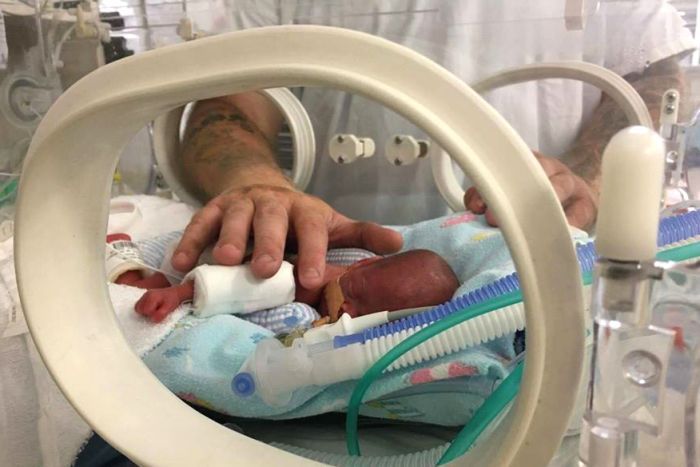Every day has been a milestone for Australian infant Hudson Hollis-Tobin.
Born after just 23 weeks in the womb, Hudson defied the odds and lived through five near-death experiences, ABC News in Australia reports. Now he is seven months old, and his family is celebrating how far he has come.
Some hospitals will not treat babies born so early because they consider the point of viability to be 24 weeks. Many countries also prohibit abortions at 24 weeks or earlier.
However, growing research indicates the point of viability now is about 22 weeks of pregnancy. Earlier this fall, the journal Pediatrics highlighted a baby girl in the United States who survived after being born 21 weeks and four days after conception. The girl, who now is 3, is believed to be the youngest premature baby to survive.
Hudson is one of the youngest premature infants to survive in Australia, according to the report.
His mother Jodie Hollis-Tobin, of Brisbane, said her son has battled through numerous problems, including brain bleeds, meningitis, sepsis, eye and lung difficulties, and three surgeries.
“Because he was so sick they did the surgery in his bed, in his room,” she said of his hospital stay. “I just kept saying to the surgeon, ‘I’m trusting you’ and he said if things got worse I could go into the room and so could his dad and we could say goodbye.”
Follow LifeNews.com on Instagram for pro-life pictures and the latest pro-life news.
Hudson nearly died five times. His parents even began planning to bury him because they thought he would not live.
“Actually his father and I started picking out a little angel gown to bury him in and we were asked to pick out songs and I contacted a company to see if we could get his feet cast,” his mother said.
But Hudson proved to be a fighter. Eighteen weeks after he was born, he was well enough to leave the hospital, according to the report.
Hollis-Tobin said her youngest son still requires a lot of care, and doctors don’t know yet whether his premature birth could result in disabilities. Still, she said she is happy her son is alive.
“I definitely wouldn’t change it for the world, but it’s crazy — especially with all the hospital appointments and Hudson’s feeding tube and oxygen,” she said.
Hudson’s two older siblings also were born prematurely.
The report concludes:
Over the last three years, Ms Hollis-Tobin has spent 239 days in hospital with her babies and was now finding normality at home.
“Some days I have my moments but then I look at the three of them and they’ve come so far especially when the doctors said to me that Hudson just wouldn’t come home,” she said.
“It’s hard to believe he was ever that tiny little baby that didn’t fit in your hands or a doll’s nappy and now look at him — he’s ‘talking’ and smiling and a completely different baby.”
Recent technological advancements are helping more premature babies survive and thrive.
A Duke University study published in January reported that babies born at just 23 weeks gestation are surviving outside the womb at a greater rate than ever before. Researchers examined 4,500 babies between 2000 and 2011 and found a “small but significant drop in fatalities for babies born between 23 and 37 weeks gestation,” as well as a decrease in premature babies manifesting neurophysiological problems, the Daily Mail reported.








